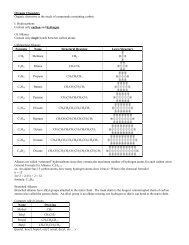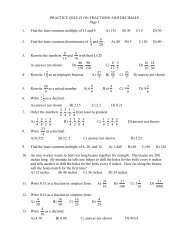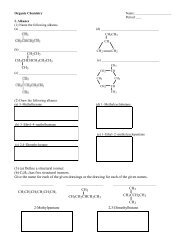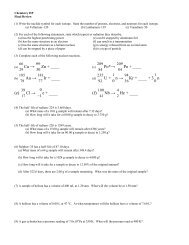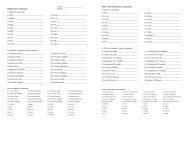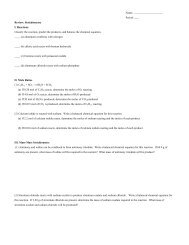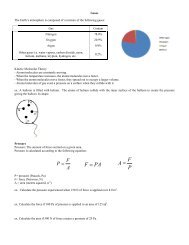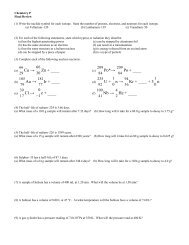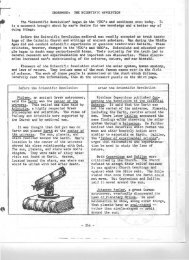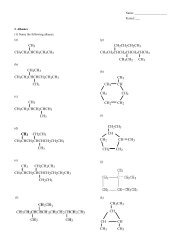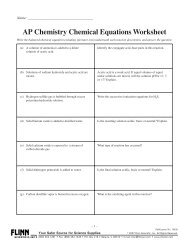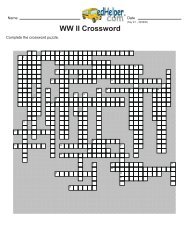Imprisonment of Socialists – As a result of the new acts, IWW members and Socialists facedmajor problems. For example, Eugene V. Debs, the leader of the Socialist Party, was arrestedfor speaking about the freedom to criticize the gov’t.Spread of Vigilante Organizations – Some people thought they would help outby…umm…helping get rid of unpatriotic people or bullying them into buying Liberty Loans andsuch. These organizations included the Sedition Slammers and <strong>Am</strong>erican Defense Society.- These steps led to a questioning of the whole free speech thing – CO Roger Baldwin founded the CivilLiberties Bureau to defend people accused under the E/S Acts and redefined free speech as somethingseparate from the identity of the speaker.- Two important SC cases also dealt w/the new developments: Schenck v. US (1919), in which Holmesupheld the EA by using the whole fire in a movie theater argument [if there is a “clear and present” dangerfree speech should be restricted], and Abrams v. US (1919) in which the SA was also upheld [but this timeHolmes and Brandeis dissented].*The <strong>Am</strong>erican Reaction to the Bolshevik Revolution: Labor Strikes and the Red Scare*- Almost as a continuation of the suppression of civil liberties that occurred during the war, <strong>Am</strong>ericanscontinued to oppress radicals following the Bolshevik Revolution in 1917 – they worried about Bolshevism inthe country, and resented Russia as a result of its separate peace w/Germany after the revolution.- In fact, Wilson despised the Russians so much that he even fought an undeclared war against Lenin andco. by sending military expeditions to “guard Allied supplies and rescue Czechs” in Siberia. He also refusedto recognize the Bolsheviks, sent arms to their opponents, and economically blockaded Russia.- At home, of course, unemployment and the post-war recession contributed to anti-radical sentiment aswell. In 1919, a series of labor strikes [think Boston police strike and so on, not anything that was actuallyradical] and an incident with mail bombs on May 1 led to the Red Scare.- A steel strike partially led by an IWW member only made things worse by allowing leaders to label thestrike a conspiracy by foreign radicals, which was not the case as the <strong>Am</strong>erican left was actually badly splitbetween the Communist Labor Party and the Communist Party.- Consequently, anti-radical elements like the <strong>Am</strong>erican Legion joined with Wilson’s attorney general A.Mitchell Palmer, who was appointed as head of the Radical Division of the Dept. of Justice, in chasingdown supposed Reds. This climaxed in the January 1920 with the Palmer Raids – gov’t agents broke in tomeeting halls and homes w/o warrants and arrested lots of people.- The anti-red activities were regarded as anti-Constitutional by many civil libertarians, and evenconservatives turned against Palmer when he asked for a peacetime sedition act. But e/t Palmer’s activitiesstopped for the most part in 1920, <strong>Am</strong>erican radicalism had suffered big time.*<strong>Am</strong>erica and the Postwar World*- During the whole Red Scare deal, Wilson actually was more into internat’l relations than anything else. Hebegan by announcing his Fourteen Points, which included self-determination, freedom of the seas, lowertariffs, arms reduction, open diplomacy, blah, blah, blah…and the League of Nations.- It was a nice idea and all, but when Wilson arrived in Paris in December 1918 for the Peace Conference,he had already screwed himself over in several ways – by being cocky and by not bringing any RepublicanSenators with him [the Republicans had swept the Congressional elections]. Another problem he faced wasthe fact that the other allies – France, Britain and Italy – wanted to see Germany majorily punished.- So, at Versailles, the Big Four met secretly, and came out w/a treaty that included the dreaded war guiltclause and huge payments for Germany. Also, it placed German/Turkish colonies under the control of otherimperial nations [that was self-determination I guess] and made new democracies in Eastern Europe.- As for the key part, the charter for the League of Nations, Wilson came up w/a council of 5 permanentmembers [and some elected delegates from other states], an assembly of all members, and a world court.Most importantly, there was Article 10, a collective security provision, which made members promise toprotect e/o’s territorial integrity against aggressors. Germany was forced to sign, but it still wasn’t all good…- This was b/c there was strong opposition to the treaty at home, where Senators [and others] felt that theVersailles’ Treaty didn’t protect US interests enough, and that Article 10 was going to get the country stuckin a ton of foreign entanglements. Charges of hypocrisy were also rampant, as Wilson’s points hadn’t reallybeen included in the Treaty.- There were two camps of opposition, basically: the Irreconcilables (no treaty, no way) and theReservationists (yes, but make changes first). Senator Henry Cabot Lodge was one of those urging slightamendments to the charter, esp. making it so that Congress had to approve obligations under Article 10.- In response to the opposition, Wilson went on a speaking tour and pretty much out-talked himself, leadingto a massive stroke. The Senate continued to reject the Treaty – Wilson refused to <strong>com</strong>promise – and so itnever passed. The US eventually made a separate treaty w/Germany instead.58
- So – the point of this episode? Basically, that <strong>Am</strong>ericans still wanted to stick to nonalignment overcollective action. As a new world power – the leading economic power, first in world trade, first in banking,and so on – we wanted to stay away from potential entanglements.- The disappointment about the Treaty also did two opposing things: increase the peace movement andappeals for arms control, and lead to a better trained more professional military. But the bottom line is thatmaybe b/c of US non-support (or at least somewhat b/c of it) the internat’l system after the war was crap.- Russians were pissed b/c people tried to rain on their parade – I mean, revolution; Germans were annoyedat the reparations, the Eastern European states weren’t doing so good, and there were many nat’listuprisings from the good to the bad to the downright ugly. Stay tuned for the ongoing saga…The Roaring Twenties (1920 – 1929)*Economic Trends*- The economy is perhaps the most important aspect of the 1920s [so if you don’t read the rest read thispart]. Here are some of the economic characteristics of the era: Initial Recession Followed by Recovery – Following the end of the war, as demand droppedand soldiers returned looking for jobs, the economy faltered. Farmers were hit especially hardw/the return of worldwide <strong>com</strong>petition. But w/new inventions and such, recovery was rapid,except for the farmers, who faced continued hard times. A Retreat From Regulation – After the war, the regulatory institutions were quickly dismantled(the ones that remained cooperated more than regulated), and the SC & Presidents went probusinessagain. Some SC cases included: Coronado Coal Co. v. United Mine Workers (1922) – Striking unions were deemed inrestraint of trade. Maple Floor Association v. US (1929) – Anti-union groups ruled NOT to be in restraintof trade. Regulations on child labor and a minimum wage law for women were also overturned. Corporate Consolidation – No regulation? Great! Let’s make big mega <strong>com</strong>panies! Lobbying – There was also consolidation in special interest groups – professional associationsand such – which resulted in the “new lobbying” where organizations sent reps to Washingtonto try to convince legislators to support their cause(s). Rampant Materialism – New products! Cars! Radios! Advertising! More purchasing power forthe average individual due to technological breakthroughs! The new products even benefitedthe lower classes, as cities were electrified, indoor plumbing spread, and mass producedclothing and food became more affordable. Hard Times For Labor – In addition to the SC rulings, public opinion turned against strikers,corporations caught onto “welfare capitalism” [pensions, profit sharing, <strong>com</strong>pany events], andlegislators ruled that open shops [which discriminated against union members] were allowed.*The Presidents and Political Trends*- Basically, the 1920s Presidents were all pro-business Republicans. More specifically, they were as follows: Warren G. Harding (1920 – 1923) Harding was elected in 1920 on the slogan of “A Returnto Normalcy” or something like that. <strong>His</strong> administration favored laissez-faire business and alsostreamlined federal spending [Budget and Accounting Act] and assisted farms throughliberalizing credit. The main problem w/Harding was corruption, culminating in the 1923Teapot Dome scandal, which revealed that the Secretary of Interior had accepted bribes togive gov’t property to oil <strong>com</strong>panies. Harding died in office in 1923. Calvin Coolidge (1923 – 1924, 1924 – 1928) “Silent Cal” took over after Harding died andwas then reelected in 1924 by running on “Coolidge prosperity.” Overall, Coolidge and co.didn’t do diddly squat while in power, other than reduce debt, cut taxes, build roads, and stopthe gov’t from interfering w/business. Herbert Hoover (1928 – 1932) Hoover won against Democrat Alfred E. Smith [who isnoteworthy as the first Catholic candidate and builder of part of the New Deal Coalition – i.e.he got the urban immigrants voting Democratic] and then proceeded to keep the cooperationbetween business and gov’t going strong. Everything was going great, until a slight problemcame up: The Great Depression. But that’s to be continued…- Anyway, following Coolidge’s reelection, many began to claim that Progressivism had indeed died out. Ona nat’l level, it had. But remember…there was still reform going on at state & local levels – stuff like workers’<strong>com</strong>pensation, pensions, welfare, and [in cities] planning and zoning <strong>com</strong>missions.59
- Page 3 and 4:
Congregationalists (Puritans) - The
- Page 5 and 6:
- So the Restoration Colonies, form
- Page 7 and 8: - So in England, where they were lo
- Page 9 and 10: *Colonial Politics 1700-1750: Relat
- Page 11 and 12: - Another ideology that was beginni
- Page 13 and 14: - The Quebec Acts were passed aroun
- Page 15 and 16: - So, by 1782, what had seemed to b
- Page 17 and 18: on the economic side, since the gov
- Page 19 and 20: - Anyway, Congress had several ques
- Page 21 and 22: - Adams was still in the early Wash
- Page 23 and 24: *Political Factionalism and Jeffers
- Page 25 and 26: - Samuel Slater set up the first te
- Page 27 and 28: - Court rulings extended the powers
- Page 29 and 30: Revival, Reform and Politics during
- Page 31 and 32: - Anyhow, during his administration
- Page 33 and 34: TEXAS (Southerners) - Texas had bee
- Page 35 and 36: - Anyhow, Pierce’s total support
- Page 37 and 38: They had a smaller everything: smal
- Page 39 and 40: - The two Northern victories at the
- Page 41 and 42: - The result was the Fourteenth Ame
- Page 43 and 44: The Slaughter-House Cases (1873) -
- Page 45 and 46: in the arrest of 8 immigrant radica
- Page 47 and 48: case (1897 - ICC can’t set rates)
- Page 49 and 50: - The Populists prepared to run aga
- Page 51 and 52: - MOST IMPORTANTLY, though, was the
- Page 53 and 54: - So, what led the US to undertake
- Page 55 and 56: - The rebellion, led by Emilio Agui
- Page 57: - Still, Americans managed to turn
- Page 62 and 63: *Hoover’s Response*- Poor Herbert
- Page 64 and 65: - In FDR’s second term, however,
- Page 66 and 67: Dominican Republic - When we left i
- Page 68 and 69: World War II (1941 - 1945)*The Cour
- Page 70 and 71: - So Truman started off again all c
- Page 72 and 73: - First of all, the 1950s were (for
- Page 74 and 75: peace w/Japan that ended occupation
- Page 76: - France wanted out, so at the Gene



